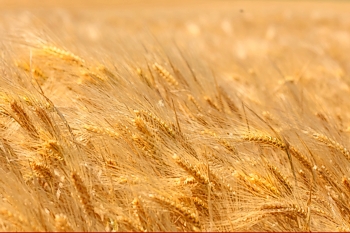
After a dry spell that lasted way too long for our farmer-neighbors’ preference, we’ve been having a lot of rain in the last couple of weeks, and as a result the grain in the fields has made up for lost time and is now coming along a lot better than it was doing in May and early June. The atmosphere of relief around here is palpable. Most of what’s grown in our immediate neighborhood barley rather than wheat, and destined for Guinness or anomal feed rather than anyone’s bread machine. But the locals still depend on the crops they grow to keep them (or their cattle) eatingafter the growing season is over.
The wildlife is also interested in eating that grain, of course, and as a result a sound specific to this time of year is now to be heard day and night: the bird-scarer. This is a simple device that creates a loud gas-powered BANG at intervals. (The better sort of these create the noise at random intervals rather than just doing it once every, say, four minutes and thirty seconds. But both kinds are in use within earshot of the house.)
You quickly learn not to notice this sound after a while (or else you go stark raving nuts…). But this morning I found myself noticing the noise, and realized that it was trying to remind me of something: specifically, the half-finished story of which a fragment follows — this passage being what was triggered by hearing a series of those BANGs late last summer. The story, “Borderlands”, takes place between the events of The Door into Sunset and The Door into Starlight; in it Herewiss is called in to solve a particularly nasty series of murders. Freelorn goes along with him, partly to get away from some of the more annoying aspects of being a king (like work…) and partly because, in general, there’s just no keeping him out of Herewiss’s business anyway. As the story develops, this turns out to have been an extremely good thing…
Really must finish this: it doesn’t have that much further to go. The story will turn up at the online store when it’s done (since there are already some other MK-based works on offer there), and maybe I’ll submit it someplace as well. Meanwhile, the fragment is under the cut.
…Freelorn walked in the fields and thought about it. Nothing particularly liked the idea of dying. You could talk about the cycle of life all you pleased, but when it came down to personalities, it came hard: as it had to Her. Even though in the long term you might know that existence outside of life went on, and someday She would be able to start over and put it all right, at the moment it always came as a shock. Every year he walked the fields full of grain, unable to resist listening to the shout of every upward-striving ear: I grow, I live in the sun, I will live forever! But always he knew it was only a matter of time before the ears swelled, before the sun began to lean southward again, slowly retracting the immemorial gift, before the leaves of the stalk began to go dry and yellow. Ripening, men might call it. But amid the wheat, as it suddenly sensed something final going wrong with the way it used the sun for food, there always came a terrible moment of realization, a stricken whisper under the wind: Wait a moment — !
It wasn’t much point telling the wheat that its impending death would mean the life of much new wheat, as well as the nourishment of those who thanked the ensuing bread as they broke it, seeing their own lives prolonged another year. The viewpoint of wheat in such moments of shock and grief was at best limited. At such times Freelorn came most poignantly face to face with a corn king’s duty: to be king to corn as well as men. He had to be there for the stalks of wheat as much as for those who would feed on what fell from them on the threshing floor. He took the duty seriously, as he sharpened the golden sickle to reap the first ear in sorrowful silence, and the iron one to cut the last one quickly off at the knees: waste nothing, do the work well and swiftly, be courteous to what dies for you. Some day he too would be the last sheaf standing, the one waiting for the Winnower, the Lady with the Sickle: with that day in mind, he watched over the harvest with care.
Still, it always hurt. It is the duty of kings to suffer the corn’s pain, so that the men they rule will not suffer it, and die starving. And there was danger too, for as in any mortal creature, among the wheat that time of death was a vulnerable one: unless the anger and despair were helped to pass quickly, that was when the ergot got in the rye, and the rust into the wheat-ears. A king had to walk the harvest listening for any breath of Her old enemy whispering in the wind, lest through the broken hearts of the green things dying the old Death enter in again for men. At the end it was always a relief to walk the fields of stubble, among the rooks and sparrows gleaning among the naked stumps of stalks, and know everything over and done, and done well, safe to relax the vigilance at last…
